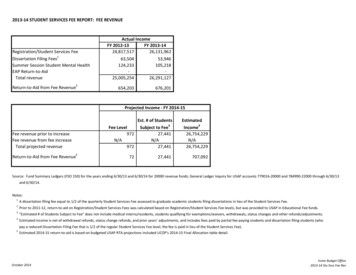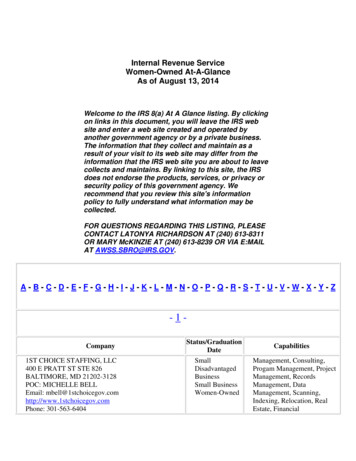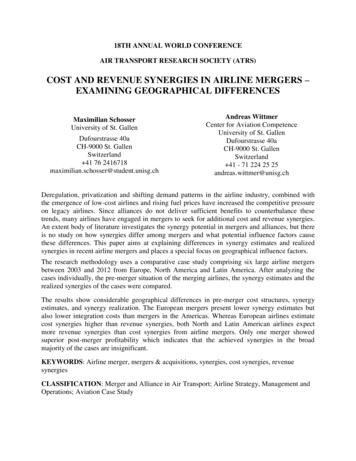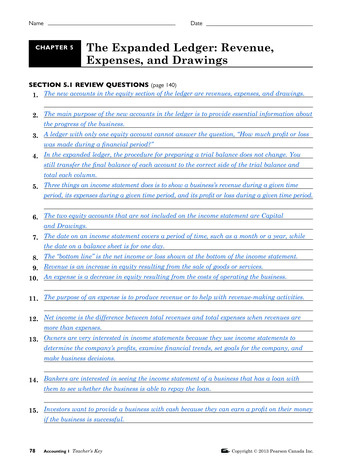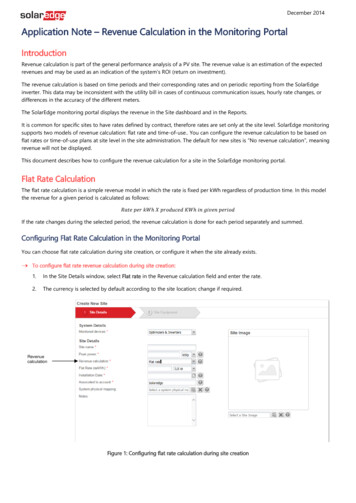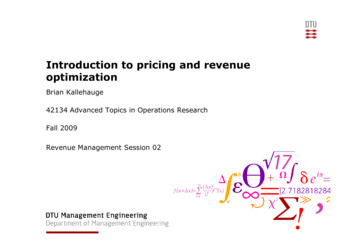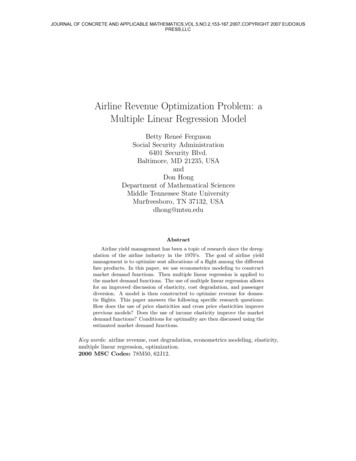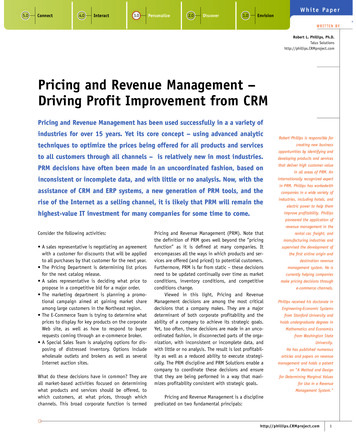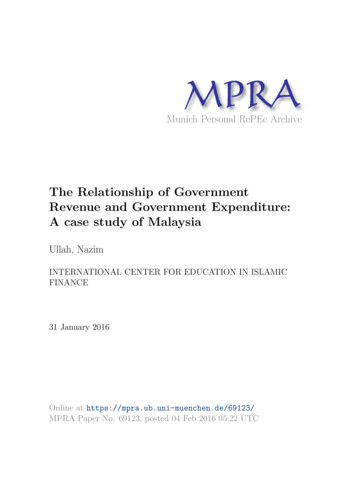
Transcription
Munich Personal RePEc ArchiveThe Relationship of GovernmentRevenue and Government Expenditure:A case study of MalaysiaUllah, NazimINTERNATIONAL CENTER FOR EDUCATION IN ISLAMICFINANCE31 January 2016Online at https://mpra.ub.uni-muenchen.de/69123/MPRA Paper No. 69123, posted 04 Feb 2016 05:22 UTC
“THE RELATIONSHIP OF GOVERNMENT REVENUE AND GOVERNMENTEXPENDITURE: A CASE STUDY OF MALAYSIA”.Nazim Ullah1ABSTRACTMalaysia is a developing Islamic state that faced budget deficit since 1998.But it is not accepted by all and hopes that state should be in a position ofeither balance budget or surplus budget. The optimum level of Governmentbudget is the state where government expenditure is totally offset by sourceof government revenue and that can be achieved through increasing taxrevenue or decreasing expenditure. The aim of this study to find out thetheoretical relationship between the revenue and the expenditure inMalaysia using the four hypotheses from literature study. The study findsout that although majority of the government revenue is from direct tax, thegovernment spending only varies due to change in indirect tax revenue andnon-tax revenue. Basically the study is analytical in nature and based ondata collected from published sources focusing on the impact of therevenue and the expenditure on the continuous development of theMalaysia. Finally, we try to suggest to the authority to follow the properrules and guidelines at the time policy making whereby they will be able tocoup up with the optimum revenue and relevant expenditure in the state.Keywords: Government Revenue, Government Expenditure, Budget Deficit, Malaysia.1M.Sc-International Center for Education in Islamic Finance (INCEIF),Malaysia.Cell 601111363659, email;kmnazim 90@yahoo.com
The Relationship of Government Revenue and Expenditure in Malaysia1.INTRODUCTIONNowadays the most important debate in macroeconomics is the mode of the associationbetween government expenditure and government revenues. Recently, the question has beenprominent with rising government budget deficits in developing countries where governmentexpenditure plays a vital part of an economy. Government expenditure is the engine ofeconomic development in every sector of the economy and enhances the living standard ofthemasses of the state.The government expenditure increasedas population grew and demographicchanges took place. The government expenditure on education and health and other publicservices increased.In Malaysia, the government per capita expenditure is much higher than in neighbouringcountries. For example, the federal government per capita expenditure in Malaysia is almost tentimes than in Indonesia, five times than in the Philippines and three times than in Thailand(Chee, 1990). Chee believes that non-economic factors have been more important in explainingthe growth of public expenditure in Malaysia than economic factors. Among the economicfactors, Chee considers the relative openness of the Malaysian economy one of the importantreasons for the growth. The political activation of ethnicity has been the most important noneconomic factor according to Chee.The economy of Malaysia is an open economy system. If anything happens in globaleconomic system, such as financial crisis on 2008, it will affectthe economy of Malaysia as wellas impact on government budget. The economic activities involve both domestic community andinternational community. That means Malaysia involve in domestic and international activitieslike export, import and foreign direct investment that also involve the other countries as theirpartner of trade. The economy of Malaysia is also a state oriented market economy. Every statein Malaysia has their own economy structure by using the budget the government gives everyyear. So, the effective usage of government budget can influence the state with higher incomeand then can contribute towards economy growth of Malaysia.However, Malaysian government has experienced budget deficits since 1998, which tendedto increase and persist, and generated considerable concern that it would reduce economicgrowth and development and lead to a crisis, if it continued too long or became too large.Page 1
The Relationship of Government Revenue and Expenditure in MalaysiaFurthermore, it raised the question of the ability of the government in settling its deficit in thelong run. The budget deficit has important implications for economic growth. Itcould reducenational savings and in turn will retard economic growth.Thus, to induce economic growth in abudget deficit economy, at leasttwo things can be done, i.e. 1) raising the national savings, and2)reducing the budget deficit (Aziz et al, 2001). A government will be able to sustain its deficitsif it can raise thenecessary funds by borrowing. However, it is feasible in the short run,but theability of the government to service its deficits by resorting tofurther borrowing is likely to bequestioned once the deficits become persistent (Wong H.T. & Lim, K.P. 2005).During the Asian financial crisis, which began in mid-1997 and ended in 1998, theMalaysian governmenttightened its fiscal policy with the fear that the economy of the countrywould become worse. The fiscal policy was mainly implemented to reduce the current accountdeficit and inflationary pressure arisingfrom the depreciation of the Malaysian currency.However, in the years immediately after the Asian financial crisis, the government implementedthe fiscal expansionary policy to stimulate the economy.The fiscal measures includedconstruction activities, establishment of funds to support small-and medium-sized enterprises, ahigherallocation for social sector development and a reduction in taxes. Thegovernment alsoallocated more funds for socio-economic projects to cushion the impact of the crisis. Specialfunds were also established orexpanded to provide credit to priority sectors at concessionaryrates(Ministry of Finance Malaysia, 2003/04).There are many factors to be considered in determining the size of the fiscal deficit such asensuring that revenue is able to meet operatingexpenditure, the availability of domestic andexternal financing without crowding out the private sector, and debt servicing does not exceed20% of total operating expenditure. Overall, to ensure that public debtremains at manageablelevels, a legislated borrowing rule stipulates a ceiling for federal government debt (Ministry ofFinance Malaysia, 2003/04).Total government revenue in Malaysia is derived from two sources, which can be classifiedas taxrevenue, and non-tax revenue. The responsibility for collecting tax revenue falls on IRBitself and Royal Customs and Excise Department. The responsibility for the collection of non-taxrevenue is based on the type of income. Direct tax revenue consists of income tax fromindividuals, companies, and other persons as well as petroleum, stamp duty, estate duty and realPage 2
The Relationship of Government Revenue and Expenditure in Malaysiaproperty gains. Indirect taxes are collected by the Royal Customs and Excise Departmentconsists of tax revenue, and is not imposed directly on the taxpayer. While Indirect taxes consistof import duties, export duties, excise duties, sales tax and service tax. Non-tax revenues consistof fees for issue of licenses and permits, fees for specific services, proceeds from the sale ofgovernment assets, rental of government property, bank interest, returns from governmentinvestments fines and forfeitures.Spending increases every year in Malaysia as well as throughout most of the world.However, the question here is whether sufficient resources are available to fund theseexpenditures. Careful budgeting is critical and a good fiscal policy is vital to stimulate a stableeconomy. Fiscal policy in Malaysia can be described as expansionary fiscal policy where there isalways an increase in spending and lower taxes (Taha&Loganathan, 2008). The governmentalways provides better incentives to both individual and company taxpayers. TheMalaysiangovernment spends public money to provide a wide variety of facilities and benefits to thepublic. From federal government reports we can classified the spending to two major categories,operatingexpenditure and development expenditure. Operating expenditure consists ofemoluments, supplies and services, asset acquisition and routine expenditures. Developmentexpenditure varied from economic services, social services, security and general administration.1.1 PROBLEM STATEMENTMalaysia is one of the developing countries in the world which has a rapid growth anddevelopment. However, Malaysia has been facing budget deficit since 1998 continuously. Beforethe Asian financial crisis 1998, Malaysia had a surplus budget for several years, under theleadership of Mahathir Muhammad as the Prime Minister.Budget deficit has become a controversy in economics. The mainstream economic positionis that budget deficit is desirable and necessary as part of a countercyclical fiscal policy, butthere should not be a structural deficit or permanent deficit. The necessity of budget deficit iscaused to create the money supply or to satisfy demand for savings in excess of what can besatisfied by private investment. In other words, budget deficit permits the private sector toaccumulate net worth. Budget deficit that caused by a huge expenditure in the public sector canincrease the economic growth of that particular country, because there will be moreinfrastructure and creates a market for business output.Page 3
The Relationship of Government Revenue and Expenditure in MalaysiaAlthoughbudget deficit has some advantages from the economic point of view, thecontroversy of budget deficit is becauseof its advantages and disadvantages to the governmentand the country simultaneously. Advocates of fiscal conservatism argue that government shouldalways run a balanced budget (and a surplus to pay down any outstanding debt), and that deficitspending is always bad policy. This argument is based on the disadvantages of budget deficit,which can increase taxation in the future, thus burdening future generations. Anotherdisadvantages is budget deficit can cause inflation to the economy and some othersdisadvantages. Based on the controversy of budget deficit, we want to see how Malaysia shouldhandle their budget deficit in the future so that it will not burden the future generations.1.2 SCOPE OF THE STUDYThe study will try to find the relationship of government revenue and governmentexpenditure for the period of 2002 – 2013. This study will also look at the GDP growth inMalaysia and its relationship with revenue and expenditure.1.3 OBJECTIVES OF THE STUDYRelated to the problem stated above, the objectives of this study are:1. To find out the overview of the Government revenue and Government expenditure2. To find out the relationship between Malaysian government revenue and expenditure3. To give suggestion and recommendation related to the study4. To ascertain the direction of causality between the disaggregated values of governmentrevenue and expenditure in Nigeria by deploying a robust econometric methodology.5. To test the causality between government spending and revenue2.LITERATURE REVIEWVarious studies and researches about the relationship of government revenue and expenditurehave been conducted by many scholars and researchers around the world. Theoretically, manyhypotheses can be used in determining the relationship between government revenue andexpenditure. These hypotheses can be divided into four: tax-and-spend or revenue-and-Page 4
The Relationship of Government Revenue and Expenditure in pend-and-revenuehypothesis;fiscalsynchronization hypothesis; and fiscal independence or institutional separation hypothesis.The revenue-and-spend hypothesistheorized that the rise in tax revenues will lead to anincrease in government expenditures and consequently worsens the governmental budgetarybalance. The hypothesis suggests that government would spend all its revenues; therefore, raisinggovernment revenues would lead to higher government expenditures. Under this hypothesis,empirical results pre-empt a unidirectional causality running from government revenues togovernment expenditures. If the revenue-spend hypothesis holds, then budget deficits can beeliminated or avoided by implementing policies that stimulate or increase government revenue.The second hypothesis, spend-and-revenue hypothesis, is a reverse of the revenue-andspend hypothesis in which revenue responds to prior spending changes. This hypothesis suggeststhat government would raise the funds to cover its spending, and therefore, higher governmentexpenditures lead to higher government revenues. Thus, empirical results are expected to show aunidirectional relationship running from government expenditure to revenue. If the spendrevenue hypothesis holds, it suggests that government’s behaviour is such that it spends first andraises taxes later in order to pay for the spending. This situation can bring about capital outflowas a result of the fear of consumers paying higher taxes in the future (Eita and Mbazima, 2008).The third hypothesis, the fiscal synchronization hypothesis or the fiscal neutralityhypothesis indicates bidirectional relationship between revenue and spending. If the bidirectionalcausality between government revenue and government expenditure does not hold, it means thatgovernment expenditure decisions are made without reference to government revenue decisionsand vice versa. This situation can bring about high budget deficits if government expenditureincreases faster than government revenue.The last hypothesis is the fiscal independence or institutional separation hypothesis wheredecisions on revenue are taken independently from allocation of government expenditure, andtherefore no causal relation between revenue and spending is expected
consists of tax revenue, and is not imposed directly on the taxpayer. While Indirect taxes consist of import duties, export duties, excise duties, sales tax and service tax. Non-tax revenues consist of fees for issue of licenses and permits, fees for specific services, proceeds from the sale of government assets, rental of government property, bank interest, returns from government investments .
